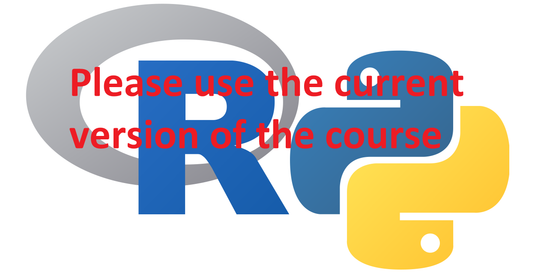
This is a past course: please register in the current course version.
Basic concepts of programming in Python and R for Digital Health.
This course is open to anyone interested in learning to code, also outside of the field or the HPI master program. Some of the exercises are health-related :)
Kurssprache: English
Kursinformationen
This is a past course: please register in the current course version.
Welcome to the course "fundamentals of programming for digital health" by Berry Boessenkool at the chair of Bert Arnrich, Digital Health Cluster, Hasso Plattner Institute in Potsdam.
This course is open to anyone at anytime if you want to write good code. With the videos and autograded exercises, you can learn a lot!
The tutorial sessions are primarily aimed at the Digital Health master students, but usually some seats are still available, so while the course is running, feel free to join :).
Topics include data structures, program control statements (conditional execution, loops, etc.), data input/output, analysis and visualization for Python (6 weeks, 2024-10-14 to 11-18) and R (9 weeks, 2024-11-25 to 2025-02-04), see details below.
The course is set up to technically require no previous programming skills. However, if you have little coding experience, you'll have to spend more time on this course than expected by the credit points. The weekly time requirement is between 7 and 11 hours for most participants in past years.
You can prepare for R ahead of the semester with my short R course if wanted.
The lectures are presented in short online videos accompanied by interactive programming exercises through CodeOcean. They can be watched / solved at your own time and pace.
The tutorial sessions take place in person on Mondays (13:30-15:00) in G2.U.10 (Campus III, Digital Health Center, basement floor).
The Tuesday timeslot is not used on our side.
The tutorials are designed to:
- answer your questions and those posed by others
- look at your code for things that may be optimizable or even bad habits
Grading is based 50/50 on separate Python (November 25) and R (February 10/17) exams.
Lernmaterial
P1: intro & functions:
Python intro, syntax, data types, character strings, writing functionsP2: objects:
Collections (overview), lists, sets, tuples, dictionariesP3: loops:
conditional code execution, loops, list comprehensionP4: programming:
managing errors, writing classes, unit testsP5: data science:
numpy, pandas, missing values, applicationsPython exam:
Nov 25R1: intro:
welcome, showcase, configuration (R & Rstudio), interactive exercises, syntax, help, vectorsR2: basics:
statistics, functions, conditions, packagesR3: data types:
logicals, charstrings, categories, overviewR4: objects:
data.frame, matrix, list, arrayR5: real data:
read, merge, missing values, sourcesR6: plots:
scatterplots, line plots, barplots, low level commandsR7: figures:
composition, histograms, boxplots, exporting, outlookR8: flow control:
debugging functions, loopsR exam:
Feb 17
Für diesen Kurs einschreiben
Lernende
Dieser Kurs wird angeboten von

Berry Boessenkool gibt seit 2012 R Kurse in unterschiedlichen Formaten. Er hat sich als freiberuflicher R Trainer und Berater selbstständig gemacht und arbeitet in Teilzeit als Dozent am HPI. Seine Leidenschaft zum Programmieren wurde im Studium der Geoökologie geweckt und die Analyse von Umweltdaten ist ihm nach wie vor ein Herzensanliegen.

Prof. Dr.-Ing. Bert Arnrich leitet den Lehrstuhl "Digital Health - Connected Healthcare" am Hasso-Plattner-Institut. Er beschäftigt sich mit dem Erfassen und der Analyse von gesundheits-relevanten Daten aus dem täglichen Leben. Ziel ist die Mitgestaltung eines zukünftigen Gesundheitswesens in dessen Mittelpunkt die Erhaltung einer gesunder Lebensweise steht.
Bert Arnrich hat "Naturwissenschaftliche Informatik" an der Technischen Fakultät der Universität Bielefeld studiert. Im Jahr 2006 erhielt der den Doktortitel Dr.-Ing. für seine Doktorarbeit "Data Mart Based Research in Heart Surgery". Zwischen 2006 und 2013 hat er die Forschungsgruppe "Pervasive Healthcare" am Wearable Computing Lab der ETH Zürich geleitet. Er erhielt ein Marie Curie Stipendium der Europäischen Union und wurde 2013 zum Assistenz-Professor am Computer Engineering Department der Bosporus Universität ernannt. Zwischen 2017 und 2018 arbeitete er als Science Manager für Emerging Technologies bei Accenture.